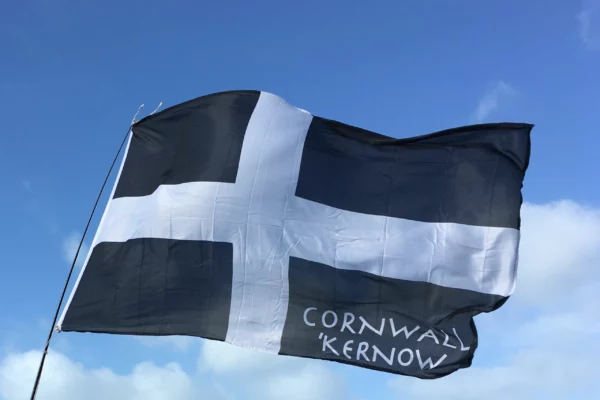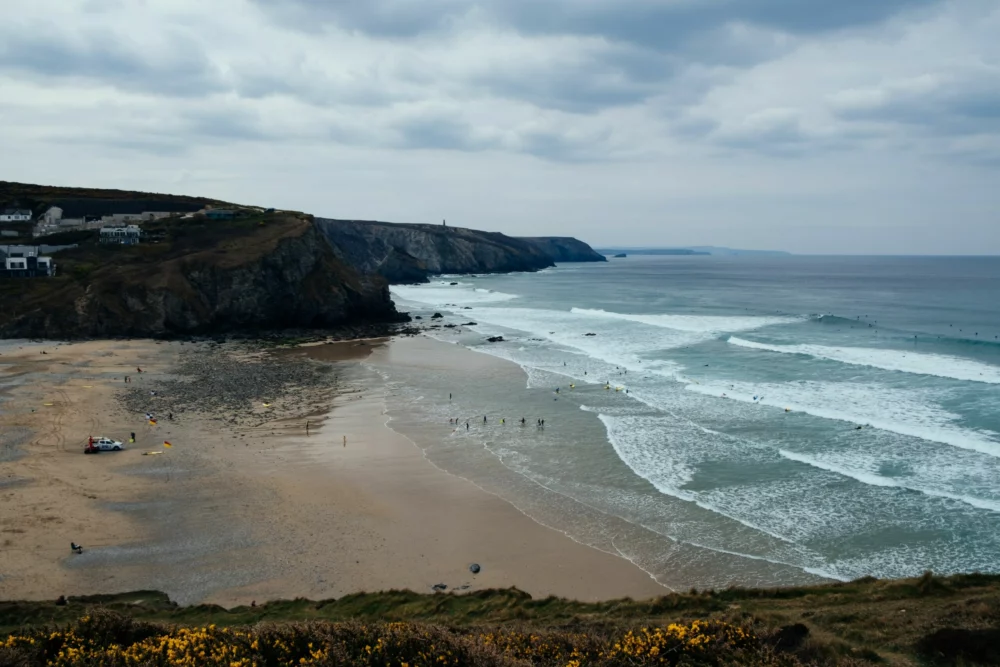- The Great Cornwall Guide
- Destinations
- Things to do
- Beach Guide
- Food & Drink
- Properties
- Journal
- Golden Lobster Reviews
- Destinations



Kernow a’gas dynergh – Welcome to Cornwall! Kirstie Newton explores Kernewek the Cornish language that many are trying to keep alive. And why not learn some Cornish phrases before you visit our beautiful duchy?
When you go on holiday to another county, chances are you’ll invest in a phrasebook to help you with the language. It can enable you ask for things or make conversation, it’s more polite than simply shouting in English, and it will reap cultural rewards too.
Newsflash: you can do the same when you visit Cornwall. Not only will it enrich your experience immeasurably, but it will also open your eyes to the secrets writ large across its landscape, and perhaps give you an insight into what makes the locals tick.

“When I went to Greece, I learned some Greek,” says Will Coleman, founder and director of Golden Tree Productions, which runs the Go Cornish language education programme. “When I went to Japan, I learned Japanese. I’m fascinated by how you get a complete mindset and universe in each language. It’s the same as learning about the ecology and biology of a place.”
Kernewek, as it is known in Cornish, is part of the Celtic language family that clings to the western Atlantic seabord and includes Irish, Manx, Scottish Gaelic, Welsh and – its closest relation – Breton. “The importance of Cornish is global rather than inward looking,” says Will.
The earliest written example dates back to the ninth century, but as English became increasingly predominant, Kernewek was pushed further and further west. Legend has it the last native speaker was Mousehole resident Dolly Pentreath, who died in 1777 – there’s even a blue plaque on her house.
This is a matter of some dispute; but few would argue that the revival of the Cornish language began in the early 20th century, thanks largely to the pride and determination of scholar and proud Cornishman Henry Jenner.
A century later, Cornish was recognised by the UK government under the European Charter of Regional Minority Languages in 2002, a status that would guarantee its ongoing protection and development. This was reinforced when the Cornish were recognised as a national minority in 2014, under the Council of Europe’s Framework Convention for the Protection of National Minorities.

Today, the Cornish Language Office is part of Cornwall Council. As well as ensuring Kernewek is reflected throughout local authority business, the office also keeps the Cornish dictionary comprehensive and up-to-date – as recently as 2022, academics were considering gender-neutral terms and non-binary pronouns in the language.
Jowdy Davey, Cornish Language Lead for the council, has the job of making people more aware of the language. She estimates that around 300 fluent speakers and over a thousand more known to have a working knowledge of Kernewek, with around 2,000 signed up to language apps.
As the daughter of Grand Bard Merv Davey and his Bard wife Alison, she grew up hearing Cornish at home. “But I didn’t actually learn it myself until I went to London,” she admits. “I felt homesick, so I enrolled on a City Lit adult education course, and made a lot of Cornish-speaking friends. Who knew it would bring me back here?”
The office works with businesses seeking to use Cornish, including company names and advertising – in May 2023, Kelly’s ice cream became the first to run a television advert entirely in Kernewek.

Anyone can make use of the translation service, which offers 40 words for free. Popular requests include house and place names, and as a wedding celebrant, Jowdy has used Cornish words in many a ceremony. “It’s often requested and always very well received, especially by couples who choose to marry here because it is a special, beautiful place.”
Will learned his first Cornish words 50 years ago, via a paper towel at home decorated with numbers from one to 10. “I was obsessed with it,” he recalls. Later, at secondary school in Callington, he was taught by Wella Brown, author of A Grammar of Modern Cornish. “Friday lunchtimes, while the cool kids were playing football, I was with the anoraks learning very basic Cornish.”

After years of “dabbling” in the language, largely through the medium of song, Will took his first exams in the language and wrote Tales From Porth, a series of miniature educational books featuring Cornish-speaking characters. They are still being used to this day, and the Go Cornish programme is currently reaching over 7,500 children in primary schools throughout the duchy, with a waiting list.
This is important, as these youngsters are the next generation of potential speakers and therefore crucial to Kernewek’s survival. “There are around 6,000 languages in the world, half of which are spoken by people over the age of 50,” says Will. “In 50 years’ time, it’s estimated that half of those languages will be extinct. To me, that’s the same kind of tragedy as losing biodiversity.”
Will also collaborated with First Kernow to provide Cornish dialect phrases for the backs of their buses. “Language and dialect are very different things,” he points out. “Dialect is a characterful and engaging way of speaking English, while the Cornish language is entirely distinct from English.”
They might not be Kernewek, but they are certainly great fun. Personal favourites include “’er’s a bit cakey” (rough translation: “She’s a bit slow on the uptake”) and “Madder do-ee?” (“Does my face look bothered?”). “I have known people cross three lanes of traffic to read the back of a bus in case it’s one they’ve never seen before,” laughs Will.
Perhaps most importantly of all, by learning even just a little Cornish, you are playing your part in preserving the language so it will never die out again. “The language is something for everyone,” says Jowdy. “You don’t have to be fluent to use it and enjoy it. Even if it’s the odd word is key to keeping the language alive. Never agonise over how little Cornish you have – be proud of what you can say.”
Cornwall 2024 Collection
Whether it’s an unrivalled location, a panoramic sea view you can’t wait to wake up to, or a bubbling hot tub, these properties have the wow factor and are our most popular choices for 2024.
Start with a few key words. For example, greet friends/relatives/bus drivers with “Dydh da” (hello) or “Myttin da” (good morning), and toast your pint of Doom Bar with a “Yeghes da” rather than “Cheers!” Celebrating a special occasion? Wish your loved one “Penn bloodh Lowen” on their birthday, while “Keslowena” makes a great substitute for “congratulations”.
Keep your eyes peeled. Have you noticed how place names change the minute you cross the Tamar? “A visitor would gain a huge amount from learning how to decode Cornish place names,” says Will Coleman. “From an early age, I learned what they meant, unpicked them and applied them to other places.” A prime example of this is the old rhyme, “By Tre, Pol and Pen, shall ye know all Cornishmen.” Tre means homestead, Pol pool and Pen hill; you’ll see these prefixes in towns and villages all over Cornwall, and also on street signs, which proudly bear their Cornish translations.
Use a language-learning app. Go Cornish has links to Memrize for adults/teens and Magi Ann for youngers speakers (find links at gocornish.org), while Jowdy Davey also recommends indigenous language specialistsIndyLan.
Seek out places where you can speak Kernewek. Order your coffee in Kernewek at the Cornish Coffee Lounge, in Newquay Museum in Crantock Street. You’ll find a menu written in Cornish, handy cards offering useful words to take away, and opportunities to speak and share your enthusiasm for the language – there are also plans for regular lessons.
Take public transport. The P&R buses from Tregurra and Langarth through Truro city centre announce stops in both Cornish and English.
Time your visit to coincide with special events. The annual Cornish Language Weekend runs from April 12 to 14. A new venue is being sought following the announcement that Heartlands is to close – watch this space. https://cornish-language.org/cornish-language-weekend/
Look out for opportunities to meet fellow speakers. Speak Cornish has a calendar of events, from Yeth an Werin meet-ups for informal conversation (both around Cornwall and online) to church services https://cornish-language.org/cornish-language-calendar/; while Cornish-speaking volunteers at Wheal Martyn China Clay Museum host a monthly opportunity for all abilities, from first steps to fluent conversation https://www.wheal-martyn.com
Immerse yourself in Cornish language culture. Mercury nominated singer Gwenno, who identifies as Welsh-Cornish, has released two albums almost entirely in Cornish, and BBC iPlayer is currently showing four short films in Cornish. Radyo an Gernewegva https://anradyo.com/ plays music primarily in the Cornish language, while BBC Radio Cornwall offers a review of the week’s news in Kernewek every Sunday, available on the BBC Sounds app.
Stock up on goodies. The Cornish Language Fellowship has a shop, Kowsva, at Heartlands. It’s a treasure trove of Cornish language course books, stories and dictionaries, tales of Cornwall and its people, and second-hand books on Cornish themes. Open Wednesday to Saturday, 10am to 1pm or by arrangement. Tel. 01209 718999.
Categories: Arts & Culture, Arts & Heritage